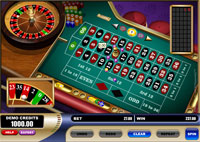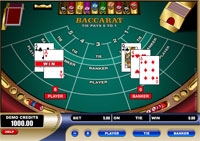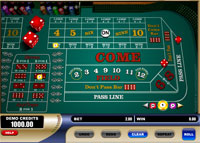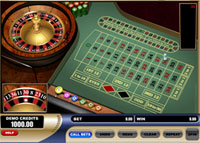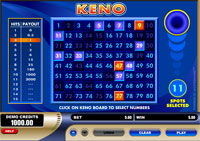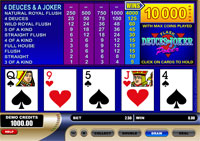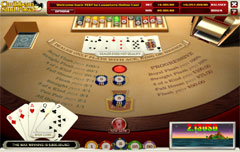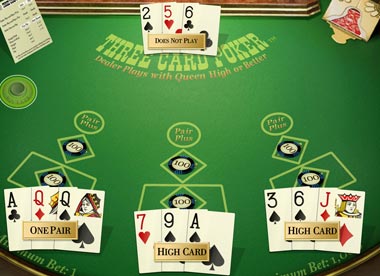Online Craps - Rules and strategy guide
Introduction to Craps game
The Dice are without a shadow of doubt the oldest gambling tool in the known history of mankind. The Dice have been around since 600 B.C. in Egypt. Dice became the only gambling tool amongst the ancient world, with the soldiers of virtually all armies playing with dice and even the Roman Emperor Augustine being a devoted Dice Player. It then was only a matter of time before someone took the idea of gambling with dice to the next level.
But the History of Craps is actually debatable. One thing that is certain is that the game originated from a game called "Hazard" and this is where it gets complicated; One theory is that it was "Sir William of Tyre" and his knights who invented "Hazard" while the besieging of a castle called "Hazarth" this would mean that Hazard is a variation of Hazarth. But another theory is that, as the Encyclopaedia Britannica says, the name came from the Arabic words 'al zar' or 'azzah' which actually means "the dice". This would obviously imply the game is of Arabic origin.
Of course the game did not have the same rules as today but it did have the basic function of the craps table. Hazard was then renamed in france to Craps as we know it today, and then it is said that either the French or the British brought the game to America where the the rules that we know and love were also invented. After the introduction of the internet and online casinos, Online Craps burst onto the scene, becoming one of the most played casino games online in the online gambling industry.

Craps Rules
Perhaps no other casino game causes as much excitement as Craps! And, while it looks complicated, you may be surprised it isn't as difficult to learn the basics as you might think. Many casinos offer complementary classes so you might want to ask about lessons before you try your luck.
Please note that the payouts, odds and percentages that are listed here are typical but can vary from casino to casino. Please check the payouts, odds and percentages for the casino you wish to play in before you make any bets. Most casinos have free Craps instruction books that list their house rules and payouts. Internet casinos can also provide you with their information.
First, it is important that you become familiar with some of the terms used in Craps. Note that during a game, you may not hear all of the terms listed here. But if you spend the time learning them, Craps will be less intimidating.
Ace: The one spot on a die.
Any Craps: Numbers 2, 3 or 12.
Around the Horn: Same as "Horn Bet". A single bet covering 2, 3, 11 and 12.
Back Line: Same as "Don't Pass". The section of the layout where you bet that the shooter won't make his or her point.
Bet The Dice To Win: You bet the shooter will make his or her point
Big 6 and 8: The section of the layout where you bet that a 6 or 8 will be thrown before a 7.
Box Cars: Two sixes.
Come Out Roll: The first roll a shooter throws. The roll to shoot a natural or establish a point.
Craps: When a 2, 3 or 12 is thrown.
Dealer: Same as the "Stick Person". Casino employee who gathers the dice with a stick or rake and slides them to the shooter. Also oversees the game and offers assistance with bet placement or questions players may have.
Deuce: The two spot on a die.
Don't Pass: Same as "Back Line". The section of the layout where you bet that the shooter won't make his or her point.
Field: The section of the layout containing numbers 2, 3, 4, 9, 10, 11, 12.
Front Line: Same as the "Pass Line". The section of the layout where you bet the dice will pass.
Hard Way: The numbers 4, 6, 8, or 10 thrown with two duplicate pairs. (Example: A hard 4 is 2, 2. A hard 10 is 5, 5.)
Hopping: A one roll bet.
Horn Bet: Same as "Around the Horn". A single bet covering 2, 3, 11 and 12.
Layout: Includes all sections of the table where bets are made.
Natural: A 7 or 11 thrown on the come out roll.
One Roll Bet: Any bet that is in action for a single roll of the dice. Some examples include - Any Craps, Field, Any 7, and more.
Pass: A natural on the first roll or shooter makes an established point.
Pass Line: Same as the "Front Line". The section of the layout where you bet the dice will pass.
Point: Any 4, 5, 6, 8, 9 or 10 that the shooter throws on the come out roll.
Proposition Bets: One roll bets that pay high odds.
Shooter: The player throwing the dice.
Snake Eyes: Two aces.
Stick Person: Same as the "Dealer". Casino employee who gathers the dice with a stick or rake and slides them to the shooter. Also oversees the game and offers assistance with bet placement or questions players may have.
The following explains the bets that can be made in Craps:
Pass Line - If you want to bet that the shooter will roll the point, place your bet on the Pass Line before the Come Out (First Roll). If the shooter rolls a 7 or 11 on the first roll, you win even money. If he rolls Craps (2, 3, 12) on the first roll, you lose. If he rolls any other number, it becomes his point. If he rolls this point again before rolling a 7, you win. A roll of 7 after the point is established, completes the shooter's hand and you lose. The dice then move to a new shooter. The pass line is a contract bet that must remain until won or lost.
Come Line - Similar to the Pass Line except that you bet on the Come Line only after the Come Out (First Roll). You can make Come bets on any and every roll after the point is established. Bets that are placed on the Come take the next roll of the dice. If the next roll is a natural (7 or 11), you win. If it is Craps (2, 3, or 12), you lose. Any other number becomes your point for that bet and your bet is moved to that number. It will remain there until that point is rolled, and you win, or until the shooter throws a 7, in which case you lose. Come bets pay even money.
Don't Pass - If you want to bet the shooter will not roll the point, place your bet on the Don't Pass Line (also known as the Back Line) before the Come Out (First Roll). If the shooter rolls a 3 or 12 on the first roll, you win. If he rolls a 7 or 11 on the first roll, you lose. If he rolls a 2, it is a Push (Tie) and no one wins. If he rolls any other number, it becomes the Point. A 7 must be thrown before this point is rolled again in order for you to win. If the point is rolled before a 7, you lose. Don't Pass bets may be removed at any time by asking the dealer to take them down.
Don't Come Line - Similar to the Don't Pass Line except that you may only bet on the Don't Come Line after the Come Out (First Roll). If you want to bet that the dice won't pass on succeeding numbers after the shooter has established his point, make your bet on the section marked "Don't Come". Bets may be placed on this section on any or every roll, but the bet applies to the next roll of the dice. If 3 or 12 is rolled, you win. If a 7 or 11 is rolled, you lose. Nobody wins if a 2 is thrown. Should any other number be rolled, it becomes the "Don't Come Point". A 7 must be rolled before the "Don't Come Point" is rolled again for you to win. However, if you have a bet on the "Don't Come" line and a 7 rolls, the "Don't Come" bet loses.
Place Bets - If you want to bet the shooter will roll a specific number (Either a 4, 5, 6, 8, 9 or 10) before he throws a 7, inform the dealer. He will place your bet on the number or numbers of your choice. You can make or take down place bets at any time. 4 and 10 pay nine to five, 5 and 9 pay seven to five and 6 and 8 pay seven to six.
Buy Bets - These bets are similar to Place Bets but with slightly different odds. If you want to bet the shooter will roll a 4, 5, 6, 8, 9 or 10 before he throws a 7, inform the dealer which number you want to buy. Buy bet minimums are $20. You must pay a charge of five percent of the wager to the House at the time you make this bet. Payoff odds for buy bets are true and correct odds - two to one on 4 and 10, three to two on 5 and 9 and six to five on 6 and 8. You may buy or take down these bets at any time. If you do take down a bet, the five percent charge will be returned to you.
Buy Behind Bets - If you want to bet that the shooter will not roll a 4, 5, 6, 8, 9 or 10 before he rolls a 7, inform the dealer which number you wish to buy behind. You must pay an added amount of five percent of the amount to be won to the House at the time you make this bet. Payoff odds for buy behind bets are true and correct odds - one to two on 4 and 10, two to three on 5 and 9, five to six on 6 and 8. You may buy or take down these bets at any time. If you do take down a bet, the five percent charge will be returned to you.
One Roll Bets - These are bets that are valid for only one roll. Bets placed on the "Any Craps" section of the layout pays seven to one. (Remember, Craps = 2, 3 or 12). Bets placed on "3 or 11" pay fifteen to one. Bets placed on "2 or 12" pay thirty to one. "Any 7" pays four to one. The dealer will place these bets for you
Horn Bets - If you want to bet that the shooter will roll either 2, 3, 11 or 12 on the next roll, make a horn bet. If the shooter rolls any of these numbers, you win. This is a One Roll Proposition Bet that pays high odds. If a 2 or 12 is thrown, it pays 6.75 to one. If a 3 or 11 is thrown, it pays three to one. The dealer will place these bets for you.
One Roll Hardway and Turn Bets - There are four "Hard Way" combinations: Hard 4 (2, 2), Hard 6 (3, 3), Hard 8 (4, 4), Hard 10 (5, 5). A one roll or "hopping" hardway is a bet that a specific hardway number will roll on the next roll of the dice. These bets pay thirty to one when the number roles and lose if any other number rolls. An "On The Turn" bet is another one roll bet that may be made on any specific combination of the dice from 4 through 10 with the exception of the hardways. Example: 3, 1 on the turn or 5, 4 hopping. These bets pay fifteen to one when the specified combination rolls and lose if any other number or combination rolls.
All Day Hardways - These bets are wagers that the shooter will throw a specific number (4, 6, 8 or 10) the Hard Way (A pair of 2's, 3's, 4's or 5's) before he rolls any other combination which makes this number, or before he rolls a 7. To make a Hard Way bet, inform the dealer and he will place your bet. You can place or take down Hard Way bets at any time. Hard Way 6 and 8 pay nine to one. 4 and 10 pay seven to one.
Big 6 and Big 8 - If you want to bet the shooter will roll a 6 or 8 before he throws a 7, you can place a bet on the "Big 6" or "Big 8" section. These bets can be placed or picked up at any time. The bet pays even money.
Field Bets - If you have a hunch the shooter will roll a 2, 3, 4, 9, 10, 11 or 12 on the next roll of the dice, you can place your bet on the field. If the shooter rolls any of the above numbers, except 2 or 12, you win even money. If he rolls a 2, you win double your bet and if he rolls a 12, you win double or triple your bet. (Different casinos pay out differently for the 12. This is why you win double OR triple. The payout for the 12 is printed on the felt of the table so make sure you notice the payout before placing a bet.)
Odds - Commonly known as "Front Line Odds" and "Back Line Odds". Players with bets on 4, 5, 9 or 10 may make an additional bet of twice their original bet. Players with bets on the 6 or 8 can make an additional bet of two and one-half times their original bet. By doing so, they are betting that the dice will make the point (Front Line or Come) or will not make the point (Back Line or Don't Come). True and correct odds are paid: On the Front Line, 4 and 10 pay two to one, 5 and 9 pay three to two, 6 and 8 pay six to five. On the back line, 4 and 10 pay one to two, 5 and 9 pay two to three, 6 and 8 pay five to six.

